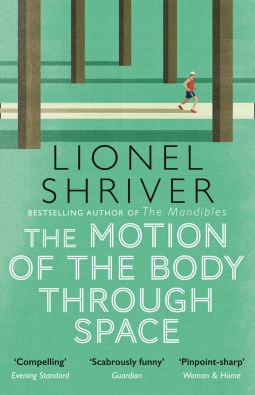
The Motion of the Body Through Space
by Lionel Shriver
This title was previously available on NetGalley and is now archived.
Send NetGalley books directly to your Kindle or Kindle app
1
To read on a Kindle or Kindle app, please add kindle@netgalley.com as an approved email address to receive files in your Amazon account. Click here for step-by-step instructions.
2
Also find your Kindle email address within your Amazon account, and enter it here.
Pub Date 7 May 2020 | Archive Date 1 Apr 2022
HarperCollins UK, HarperFiction | The Borough Press
Description
From the Orange Prize-winning author of We Need to Talk About Kevin.
Allergic to group activities of any kind, all her life Serenata has run, swum, and cycled – on her lonesome. But now that she’s hit 60, all that physical activity has destroyed her knees. As she contemplates surgery with dread, her previously sedentary husband Remington, recently and ignominiously redundant, chooses this precise moment to discover exercise.
Which should be good for his health, right? Yet as he joins the cult of fitness that seems increasingly to consume the whole of the Western world, her once-modest husband burgeons into an unbearable narcissist. Ignoring all his other obligations in the service of extreme sport, he engages a saucy, taunting personal trainer named Bambi, who treats his wife with contempt. When Remington announces his intention to compete in a legendarily gruelling triathlon, MettleMan, Serenata is sure he's going to end up injured or dead – but the stubbornness of an ageing man in Lycra is not to be underestimated.
The story of an obsession, of a marriage, of a betrayal: The Motion of the Body Through Space is Lionel Shriver at her hilarious, sharp-eyed, audacious best.
Available Editions
| EDITION | Ebook |
| ISBN | 9780007560806 |
| PRICE | £4.99 (GBP) |
| PAGES | 400 |
Average rating from 122 members
Featured Reviews
This is the first of Lionel Shriver’s books I have read, though I have been aware of her and her writing for some time. I have been missing out!
Let me say right away that the quality, clarity and exquisite use of language I discovered when I began reading “The Motion of the Body Through Space” made me gasp with admiration; the vocabulary, the flow, the alliteration and other figures of speech, the brilliant descriptions and succinct expression are all genuine ‘wow’ factors of relish for me.
The cleverly counterbalanced stories tell of long-married Serenata and Remington, a self-sufficient, perhaps even insular, couple with their jealousies and obsessions. We learn of the loss of fitness and movement due to overuse and ageing knees in the case of Serenata, juxtaposed with recently redundant Remington’s newfound passions for endurance sports, mingled with family history and more, which all create an engrossing novel (mostly) moving fast enough to keep the pages turning.
The political and social commentary which is also nicely interwoven, related to careers, relationships, religion and ‘correctness’ – that term ‘cultural misappropriation’ rearing its head – adds a note of the challenges of age, of having lived a long life in changing circumstances, and it is well documented here, as it has been in Shriver’s own life.
Highly recommended, superb writing and full of feisty flair.
 Reviewer 421976
Reviewer 421976
This is the first book I have read from this author but it will definitely not be my last. The writing style and use of language is simply superb. This is brilliantly written book and I would definitely recommend it
On one level this book is about running. Marathon, triathlon and obsessed runners in particular, and how it’s easy to get sucked into some of the cults that spring up around it.
Poor runners.
On another it’s about marriage in its later years (depending when married of course), or maybe marriage in your later years, and coming to terms with the fact that what you were physically capable of once eventually and inevitably fades.
Fine, I can be specific. Serenata is married to Remington. Someone who exercised her whole life (discreetly and alone), she now needs a knee replacement. At the same time, her newly retired husband announces he’s going to run a marathon. It’s almost a slap in the face, to throw himself into the one hobby she can’t do any more, especially when he’s so vastly unprepared for it. But he wants to better himself - how can she argue with that? Nevertheless she tries, especially when he finds a young, attractive (annoying) fitness instructor who persuades him into a triathlon.
What makes this book sing is the writing and the banter between Serenata and Remington. You may not agree with all she says and thinks, but she’s good at getting her point across. Sometimes so well she upsets her entire family, nearly-estranged children included.
I hadn’t read any Shriver since ‘Kevin’ but I’ll certainly read more now.
 Anne H, Reviewer
Anne H, Reviewer
Lionel Shriver captures the zeitgeist in her usual immaculate prose style, skewering the fads and foibles of modern society with her unerringly acute social commentary.
The targets for her scathing indictment are ripe for satire – but only a brave novelist like Shriver would dare to tackle them in this age of ‘wokeness’ and ultra sensitivity to offence – intended or not.
She zones in on all the various scourges of the modern age – such as PC groupthink, ‘cultural misappropriation’, identity politics, self-righteous virtue signalling, victimhood culture – and the main target of this novel – the obsession with the cult of exercise.
Along with the satire, Shriver's talent for observational comedy is displayed in the exchange of teasing repartee between the husband and wife - the sort of sniping and bickering that a couple can only get away with in a secure relationship, but which can be disastrous if the underlying fondness isn't there – and which is soon put to the test, as obsession turns into full-blown OCD.
... Wonderfully entertaining!
 Gillian F, Reviewer
Gillian F, Reviewer
This book was refreshing.
I have liked Lionel Shriver’s previous offerings and was excited to read this because the way she writes is beautiful to me. The flow and word selection is very clever.
I love books about people and this is a great example where we get an insight in to a couple growing old and the challenges they face.
My only criticism is I wanted more! More information about characters and at least another chapter!
Wonderfully descriptive, empathetic writing and an engrossing story again from this author. She takes themes common to all of us we age and explores them with such depth and understanding that everyone who reads this book will be able to find so much that relates to themselves, what ever their age. Our ageing bodies and minds do such bizarre things to us and to our relationships and Shriver explores this concept with breathtaking use of language, and with sympathy and understanding, drawing her characters with such skill that the reader can’t help but form relationships with the two main protagonists, and can’t help but be irritated and despairing of the oddballs and obsessives who populate the outer layers of the story. A truly remarkable book and a real joy to read on so many different levels - I am in awe of an author who can produce such writing.
 A E, Reviewer
A E, Reviewer
First of all, thank you to the publisher for having allowed me to read this in return for an honest review. Thank you, also, to the author for having written this touching exploration of a body, its ‘inhabitant’, and said inhabitant’s experience of her body moving through space - and time.
I thought this novel was exquisitely written and moving. I loved Serenata’s personality, I felt like I knew her and absolutely adored her sense of humor and way of seeing the world; the way her character ‘evolved’ through the years too and, of course, her relationship with Remington - himself a fascinating (thought also exasperating!) character. As people, they both seemed to be contending with their own limits, in different though also similar ways.
I read this novel slowly (for me, at least) and savored every page. The story is one I think I will long remember. It opened my eyes to new feelings, new ways of seeing the world, new ways to appreciate the very real (though never guaranteed!) fact of aging, while basking in the temporary nature of our shared though at the same time profoundly lonely existence.
It was a wonderful read. Thank you again.
 Sarah T, Reviewer
Sarah T, Reviewer
Have you reached that age yet when all of the men around you take up running, cycling or even worse triathlons? Men, who up til this point, have been interesting, a laugh and good for a glass of wine suddenly become lycra clad bores. They stop drinking, they disappear for hours on end and absolve themselves of familial responsibility. Marriages are discarded at the wayside along with gel energy wrappers.
I love Lionel Shriver's dry observations on society. The wife's desperate attempts to not completely talk down her husband's new enthusiasm, the daughter's fervent religious beliefs and the awful personal trainer are all perfect. I adored this book; it made me laugh, think and almost feel sad for all those triathletes who are just looking for meaning in their lives.
 Educator 381349
Educator 381349
As to be expected with Lionel Shriver, a densely written ‘treatise’ on some matter of current interest and importance. In this case, the obsession with fitness taken to the extreme. Like other novels I have read by her, there are no characters you can actually like, but you can certainly recognise aspects of all of them in people you know - and yourself. She nicely skewers the pretensions and ulterior motives of those who make their livings from the fitness industry, whatever the harm done to those who find themselves caught up in the madness of trying to keep up, even if their own health might suffer.
This is the story of Serenata and Remington, a couple in their sixties, as Remington goes through the travails and tortures of trying to become a MettleMan. I thoroughly enjoyed every line of the book which told the story through the eyes of Serenata in a somewhat cynical and amusing way. It put me in mind of John Updike's Rabbit tetralogy and Richard Ford's Frank Bascombe novels except with more dry humour.
 Leah G, Reviewer
Leah G, Reviewer
“Okay, boomer...”
Serenata has always been a fitness freak, no day complete without its allocated hours of exercises and running. So much so that, now she has reached sixty, her knees have given up the unequal struggle and forced her to learn to take things easy. Still trying to come to terms with this, she finds it rather cruel and insensitive when her husband Remington decides that, after a lifetime of sedentary laziness, he will run a marathon. Besides, she hates the new culture of fitness sweeping the country – when she started her punishing regime all those years ago, she was unusual, and that was a large part of the charm. Now when she’s out cycling it seems half the world is there alongside her, and for her running was always something you did on your own to get fit, not in crowds for pleasure. Plus, is there just a little jealousy in there? Serenata has never run a marathon… not that she wanted to, of course, but still. She is honest enough to admit to herself that she thoroughly resents Remington’s new-found enthusiasm…
This is my first Shriver so I don’t know how it compares to her other books. This one is written with a great deal of humour from the perspective of a grumpy older woman struggling to take modern attitudes seriously and derisive of the hubristic belief of the young that they have somehow invented anti-racism and feminism and know all the answers. Anyone who reads my tweets or reviews may not be too surprised to learn that this resonated strongly with me! Shriver mercilessly mocks the worst of political correctness and the ridiculous extremes of identity politics which have made us wary even of referring to ourselves as men or women for fear that that will offend someone somewhere somehow, or of inadvertently using a term that was considered not just acceptable but progressive five years ago but is now apparently an indication of some hideously unforgivable Neanderthal attitude. Poor Serenata gets very tired of people assuming that because she’s white, middle-class, middle-aged and straight, that that automatically must mean she’s racist, homophobic and downright stupid. Oh, Serenata, I feel your pain!
Remington, meantime, is going through a mid-life crisis, complete with an infatuation with another woman, his fitness coach. Serenata realises that her open mockery of his marathon ambition is driving a wedge into their long and happy marriage, so tries her best to show him support. Shriver is very funny about the whole fitness industry, where one marathon is no longer enough – people have to run at least four, consecutively, in a desert, if they want respect these days. To her horror, Remington is not satisfied by his marathon. Instead he now decides he wants to do the Mettleman Triathlon – a gruelling all-day race involving cycling, swimming and running. Serenata feels this may literally kill him, but her earlier ridicule means Remington puts her warnings down to mere petulance. Will he survive? Even if he does, will their marriage survive? Does Serenata even want it to?
I don’t know how young people will react to this – it may be making too much fun of subjects they erroneously think they own. But as someone roughly the same age as Serenata, I found it sharp and perceptive, and hilarious. I’m sure when I was young I was just as convinced my elders were all idiots, but now that I’m old I can see that the young have their fair share of idiocy too, and I look forward gleefully to the day when the youth of today are old (as they will be, sooner than they think) and are being told by their grandchildren’s generation that they failed in everything and know nothing about anything. Serenata is an unlikely heroine, but I’m sure she speaks for many of us who have spent a lifetime fighting all the ’isms only to find ourselves derided, dismissed, patronised or ignored by those who benefit every day from our achievements – even for many who would never admit it for fear of not seeming groovy/cool/woke/insert-latest-self-congratulatory-buzzword-here.
So, highly recommended for grumpy older women everywhere, and please feel free to call me Serenata from now on… *smiles sweetly*
NB This book was provided for review by the publisher, HarperCollins, via NetGalley.
Readers who liked this book also liked:
Lexi Davis
New Adult, Novellas & Short Stories, Romance
Carine Laforest;
Children's Fiction


















